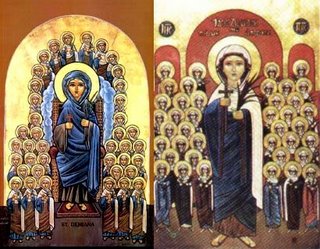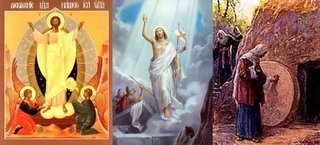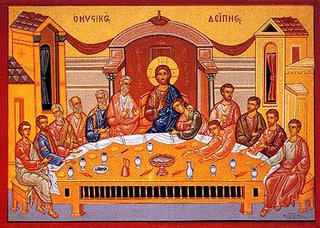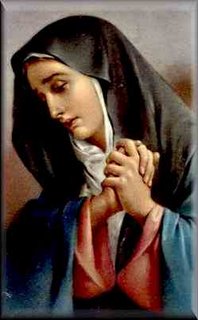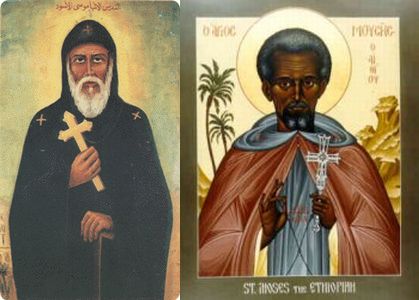
I struggled a bit this morning trying to decide what to do. Should I do a saint story today or wait until tomorrow? Really, can any story compare with the events that act themselves out in our hearts and minds today for my brothers and sisters in the Orthodox faiths around the world? Christ is Risen, Truly He is Risen!
But isn't every story worth telling, especially the story of a saint, the story of a Resurrection? Maybe not of the body, but the resurrection and redemption of the way of life we are called to and of our soul. With that thought, Moses the Black seems and obvious choice.
He is a Saint for Catholics and Copts, and I believe the Eastern Orthodox as well. Many Catholics know how St. Augustine turned from a life of vice and sin to our Lord. I have to imagine that when Augustine looks at the early life of St. Moses he blinks and says, "Wow....that's...wow.
St. Moses was, in his early life, was not (and this is putting it mildly) a nice man. He was a thief, murderer, part of a bandit pack and all around a scary individual. Just from the stories we know it is hard to imagine a crime he would not have hesitated to commit, if not enjoyed.
From his story we know:
He had been a slave of a government official in Egypt who discharged him for theft and suspected murder. He became the leader of a gang of bandits who roamed the Nile Valley and had the reputation for being associated with terror and violence.Sometimes we think when we hear that someone was "Suspected" of murder in these types of stories that the accusation is false, or that there are circumstances that might justify the act. With St. Moses, I'd err on the side of caution and say that it is very likely that he killed someone.
Moses was a large and imposing figure; he became rather notorious for his escapades. On one occasion, a barking sheep dog prevented Moses from executing a planned robbery, so he swore vengeance on the owner. Carrying out his threat, he approached the hut of his victim from the opposite side of the Nile and, placing his weapons between his teeth, swam the river. The owner of the dog heard the approach, so he hid along the river bank, thus escaping disaster, Moses, not finding the shepherd, took four rams from the flock, towed them back across the river, flayed them, sold the skins for wine, cooked the best parts, and feasted before walking back 50 miles to his camp.St. Moses did not only commit sin, he was dedicated to it. He was immersed in it. He was a hardened criminal. The kind the world says is irredeemable. So it is good that it is not the world that redeems.
When we hear of St. Moses again:
Attempting to hide from local authorities, he took shelter with some monks in a colony in the desert of Scete, near Alexandria. The dedication of their lives, as well as their peace and contentment, influenced Moses deeply. He soon gave up his old way of life, became a Christian, was baptized and joined the monastic community at Scete. (note: Some stories say he went there to rob them).A series of amazing stories follow that move a man who bathes in violence toward being washed clean by Christ in humility and peace. But did it happen all at once? Was it difficult:
Moses was tortured by his past and for years was tempted to return to his old ways. One day, as he was confessing his sins to St. Macarius, an angel appeared with a tablet full of his sins. As he confessed, the angel began wiping the tablet clean. The more he confessed, the more the angel wiped, until by the end it was completely clean. After meeting St. Macarius and St. Isidore, he completely left his old ways behind him and became a monk.In stark opposition we see how much he changed when:
The conversion of Moses was not instantaneous, he had a rather difficult time adjusting to regular monastic discipline. His flair for adventure remained with him. Once, while living in a small cell, he was attacked by four robbers. Much to their surprise, Moses fought and overpowered them, tied them together and carried them on his back to the chapel where the other monks were praying. He dumped the crew in front of the other monks and exclaimed that he did not think it "Christian" to hurt the intruders. He asked what he should do with them. According to tradition, the overwhelmed robbers repented, were converted, and themselves became monks under the influence of Moses.In his life, the harshest critic of St. Moses the Black was St. Moses himself:
He was zealous of everything he undertook, but became discouraged when he concluded he was not becoming a perfect monk advanced in all the degrees of spiritual perfection. Early one morning before dawn, St. Isadore, abbot of the monastery, took Brother Moses to the roof and together they watched the first rays of the dawn come over the horizon. They stayed there until the new day had begun. Then Isidore said, "Only slowly do the rays of the sun drive away the night and usher in a new day and, thus, only slowly does one become a perfect contemplative."Moses became a saint. An instrument in the hand of God, who played music that never forget where he came from and the forgiveness the Lord had given him:
In another incident related in the sources, one of the brothers committed a fault. A council met and Moses was invited, but refused to attend. Someone came to him to let him know the others were waiting, at which Moses went to the meeting. He took a leaking jug filled with water and carried it on his shoulder (another version has him carrying a basket of sand with a hole in it). When he arrived, the others came out to meet him asking, "What is this?" Moses replied, "My sins run out behind me and I do not see them, but today I am coming to judge the errors of another." Hearing that, they said no more to the erring brother, but forgave him.At the same time there is a simplistic beauty in how practical he was as a monk. No one denied his virtues, but to me the following story hints that common everyday people could talk to St. Moses. I feel that approachability:
The humble Moses also proved to be effective as a prophetic spiritual leader. One day the abbot ordered everyone to fast during a particular week. During that time, some brothers came to visit Moses, and he cooked a meal for them. Seeing the smoke, the neighboring monks told the abbot that Moses had broken the command. But knowing his remarkable way of life, these same monks, when they came to confront Moses, observed, "You did not keep the commandment of men, but it was so that you might keep the commandment of God." Some see in this account, by the way, one of the earliest allusions to the Paschal fast which developed in the fourth century and later became the Lenten fast.He had a simple and honest hospitality, to welcome and feed others.
In the end, St. Moses performed the ultimate renunciation of his former life:
Moses became the spiritual leader of a colony of hermits in the desert near Skete. At some time, he had been ordained a priest -- an uncommon phenomenon at that period for desert monks. When he was 75 years old, about the year 407, word came that a group of renegades planned to attack the colony. The brothers wished to defend themselves, but Moses forbade such action. He told them to retreat rather than take up the sword. He and seven others stayed on to greet the invaders with open arms, but all were martyred by the bandits.Today the life of St. Moses shows a commitment to not harming others, even in the face of death. Even if others cry for your blood, pray for their soul and that their hearts be opened. St. Moses accepted the peace of Christ. Not as something on the surface, but deep in his heart. Unto death, St. Moses the Black had his arms and heart open, restful in the peace of his Lord.
Today St. Moses the Black shows that no life is beyond the love and redemption of God. No life is beyond hope. That sometimes those who were great sinners are the greatest saints because they know what it takes to take Christ into their hearts to conquer the darkness inside. They know that to leave sin behind takes the work and desire of the sinner working in hand with the constant efforts of our loving God. They know that a fall is not the end if we grasp the hand of God, who lifts us from the death of sin.
Christos Anesti, Alithos Anesti!
He is Risen, Truly He is Risen!
Emmanuel...He is with us.
Links for St. Moses:
LinkSt. Mary of Egypt Orthodox ChurchLinkLife of Saint Moses The BlackLinkSynaxariumLink Patron Saint Index
